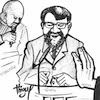2015 Press room
Here is a collection of press coverage of the Human Rights Data Analysis Group.
Back to the Press RoomCivil War in Syria: The Internet as a Weapon of War

Suddeutsche Zeitung writer Hakan Tanriverdi interviews HRDAG affiliate Anita Gohdes and writes about her work on the Syrian casualty enumeration project for the UN Office of the High Commissioner for Human Rights. This article, “Bürgerkrieg in Syrien: Das Internet als Kriegswaffe,” is in German.
Access the article off-site.Experts Greet Kosovo Memory Book

On Wednesday, February 4, in Pristina, international experts praised the Humanitarian Law Centre’s database on victims of the Kosovo conflict, the Kosovo Memory Book. HRDAG executive director Patrick Ball is quoted in the article that appeared in Balkan Transitional Justice.
Access the article off-site.New Estimate Of Killings By Police Is Way Higher — And Still Too Low

Carl Bialik of 538 Politics interviews HRDAG executive director Patrick Ball in an article about the recently released Bureau of Justice Statistics report about the number of annual police killings, both reported and unreported. As Bialik writes, this is a math puzzle with real consequences.
Access the article off-site.Improving the estimate of U.S. police killings

Cory Doctorow of Boing Boing writes about HRDAG executive director Patrick Ball and his contribution to Carl Bialik’s article about the recently released Bureau of Justice Statistics report on the number of annual police killings, both reported and unreported, in 538 Politics.
Access the article off-site.That Higher Count Of Police Killings May Still Be 25 Percent Too Low.

Carl Bialik of 538 Politics reports on a new HRDAG study authored by Kristian Lum and Patrick Ball regarding the Bureau of Justice Statistics report about the number of annual police killings, which was issued a few weeks ago. As Bialik writes, the HRDAG scientists extrapolated from their work in five other countries (Colombia, Guatemala, Kosovo, Sierra Leone and Syria) to estimate that the BJS study missed approximately one quarter of the total number of killings by police.
Access the article off-site.5 Humanitarian FOSS Projects to Watch

Dave Neary described “5 Humanitarian FOSS Projects to Watch,” listing HRDAG’s work on police homicides in the U.S. and other human rights abuses in other countries.
Access the article off-site.Kriege und Social Media: Die Daten sind nicht perfekt

Suddeutsche Zeitung writer Mirjam Hauck interviewed HRDAG affiliate Anita Gohdes about the pitfalls of relying on social media data when interpreting violence in the context of war. This article, “Kriege und Social Media: Die Daten sind nicht perfekt,” is in German.
Access the article off-site.Are journalists lowballing the number of Iraqi war dead?

The Columbia Journalism Review investigates the casualty count in Iraq, more than a decade after the U.S. invasion. HRDAG executive director Patrick Ball is quoted. “IBC is very good at covering the bombs that go off in markets,” said Patrick Ball, an analyst at the Human Rights Data Analysis Group who says his whole career is to study “people being killed.” But quiet assassinations and military skirmishes away from the capital often receive little or no media attention.
Access the article off-site.Syria’s status, the migrant crisis and talking to ISIS

In this week’s “Top Picks,” IRIN interviews HRDAG executive director Patrick Ball about giant data sets and whether we can trust them. “No matter how big it is, data on violence is always partial,” he says.
Access the article off-site.Sous la dictature d’Hissène Habré, le ridicule tuait

Patrick Ball, un expert en statistiques engagé par les Chambres africaines extraordinaires, a conclu que la « mortalité dans les prisons de la DDS fut substantiellement plus élevée que celles des pires contextes du XXe siècle de prisonniers de guerre ».
Access the article off-site.Direct procès Habré: le taux de mortalité dans les centres de détention, au menu des débats

Statisticien, Patrick Ball est à la barre ce vendredi matin. L’expert est entendu sur le taux de mortalité dans les centres de détention au Tchad sous Habré. Désigné par la chambre d’accusation, il dira avoir axé ses travaux sur des témoignages, des données venant des victimes et des documents de la DDS (Direction de la Documentation et de la Sécurité).
Access the article off-site.Death rate in Habre jails higher than for Japanese POWs, trial told

Patrick Ball of the California-based Human Rights Data Analysis Group said he had calculated the mortality rate of political prisoners from 1985 to 1988 using reports completed by Habre’s feared secret police.
Access the article off-site.Procès Hissène Habré : Le statisticien fait état d’un taux de mortalité de 2,37% par jour

Les auditions d’experts se poursuivent au palais de justice de Dakar sur le procès de l’ex-président tchadien Hissène Habré. Hier, c’était au tour de Patrick Ball, seul inscrit au rôle, commis par la chambre d’accusation de N’Djamena pour dresser les statistiques sur le taux de mortalité dans les centres de détention.
Access the article off-site.“Surmortalité carcérale” sous Habré

Le statisticien américain Patrick Ball, expert au procès de Hissène Habré, a déclaré vendredi que le taux de mortalité d’opposants tchadiens présumés dans les prisons du régime Habré était encore pire que celui des prisonniers de guerre américains dans les camps japonais.
Access the article off-site.“El reto de la estadística es encontrar lo escondido”: experto en manejo de datos sobre el conflicto

In this interview with Colombian newspaper El Espectador, Patrick Ball is quoted as saying “la gente que no conoce de álgebra nunca debería hacer estadísticas” (people who don’t know algebra should never do statistics).
Access the article off-site.Inside the Difficult, Dangerous Work of Tallying the ISIS Death Toll

HRDAG executive director Megan Price is interviewed by Mother Jones. An excerpt: “Violence can be hidden,” says Price. “ISIS has its own agenda. Sometimes that agenda is served by making public things they’ve done, and I have to assume, sometimes it’s served by hiding things they’ve done.”
Access the article off-site.Data and Social Good: Using Data Science to Improve Lives, Fight Injustice, and Support Democracy
 In this free, downloadable report, Mike Barlow of O’Reilly Media cites several examples of how data and the work of data scientists have made a measurable impact on organizations such as DataKind, a group that connects socially minded data scientists with organizations working to address critical humanitarian issues. HRDAG—and executive director Megan Price—is one of the first organizations whose work is mentioned.
In this free, downloadable report, Mike Barlow of O’Reilly Media cites several examples of how data and the work of data scientists have made a measurable impact on organizations such as DataKind, a group that connects socially minded data scientists with organizations working to address critical humanitarian issues. HRDAG—and executive director Megan Price—is one of the first organizations whose work is mentioned.
